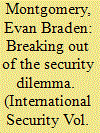|
|
|
Sort Order |
|
|
|
Items / Page
|
|
|
|
|
|
|
| Srl | Item |
| 1 |
ID:
074632


|
|
|
|
|
| Publication |
2006.
|
| Summary/Abstract |
In the debate between offensive and defensive realism, a central issue is whether major powers can overcome the uncertainty that drives the security dilemma. Whereas offensive realists maintain that states cannot know others' motives and intentions, defensive realists argue that states can reveal their preferences by altering their military posture. Defensive realists have, however, presented an incomplete account of the constraints and opportunities associated with military reassurance. To demonstrate its motives, a security-seeking state must take actions that will often increase its vulnerability to potential aggressors. Although offense-defense variables have been invoked to address the constraint of vulnerability, the conditions usually considered most favorable for reassurance-differentiation between offense and defense and an advantage for the latter-make it no easier to achieve. A defensive advantage makes reassurance difªcult by encouraging all states to adopt defensive capabilities and by requiring large concessions to reveal benign motives. Only when offense and defense are differentiated and the balance between them is neutral can states reveal their motives without also endangering their security. These arguments are illustrated with three empirical examples: the Anglo-German naval race, Nikita Khrushchev's troop cuts, and Mikhail Gorbachev's arms limitation and arms control policies.
|
|
|
|
|
|
|
|
|
|
|
|
|
|
|
|
| 2 |
ID:
119251


|
|
|
|
|
| Publication |
2013.
|
| Summary/Abstract |
Consensus amongst great powers on ballistic missile defence (BMD) may be the only way to ensure it does not undermine international security. This article applies defensive realism to explain the destabilizing effect of America's unilateral deployment of BMD. Under defensive realism, states opting for offensive strategies are punished, cooperation and reconciliation becoming more logical strategic options. The reversal of previous American policy under the Anti-Ballistic Missile (ABM) Treaty created a new security dilemma with China and Russia. Beijing and Moscow are not opposed to BMD in principle, though, and defensive realism provides a basis for improving relations, stressing joint deployment of BMD as the basis for a new paradigm of strategic relations. Defensive realism supports the conclusion that consensus amongst great powers on BMD is essential to strategic stability. It shows that the most likely alternative is worsening strategic action-reaction dynamics with unpredictable consequences. If BMD cooperation expands, however, domestic opposition will coalesce from groups with an interest in great power competition. Subsequent analysis should examine in more detail the role these groups play in influencing security policy and how they impede, or could facilitate, the emergence of BMD cooperation.
|
|
|
|
|
|
|
|
|
|
|
|
|
|
|
|
| 3 |
ID:
073686


|
|
|
|
|
| Publication |
2006.
|
| Summary/Abstract |
Why do great powers expand? Offensive realist John Mearsheimer claims that states wage an eternal struggle for power, and that those strong enough to seek regional hegemony nearly always do. Mearsheimer's evidence, however, displays a selection bias. Examining four crises between 1814 and 1840, I show that the balance of power restrained Russia, Prussia and France. Yet all three also exercised self-restraint; Russia, in particular, passed up chances to bid for hegemony in 1815 and to topple Ottoman Turkey in 1829. Defensive realism gives a better account of the Concert of Europe, because it combines structural realism with non-realist theories of state preferences.
|
|
|
|
|
|
|
|
|
|
|
|
|
|
|
|
| 4 |
ID:
166011


|
|
|
|
|
| Summary/Abstract |
This study analyzes the debate on Pakistan’s nuclear weapons program among the Pakistani elites, who include scientists, strategists and politicians. The study examines the nuclear doctrine that emerges from this, as well as the likely ways in which it can impact peace and stability on the Indian subcontinent. It also underlines the possible inuence of the Pakistani nuclear doctrine on the nuclear doctrine of other “unrecognized” emerging nuclear weapon states such as North Korea. After its creation and independence in August 1947, Pakistan’s elites considered survival to be the primary national strategic objective of the country in the harsh international environment, especially with regards to India. This understanding shaped Pakistan’s security policy in the early years, post August 1947. The three wars Pakistan fought with India proved that the collective security policy and the anti-nuclear weapons advocacy by Pakistani defensive realists was not the best strategy in the prevailing security environment. In this backdrop, the Multan meeting in January 1972 initiated a fierce debate on whether a nuclear weapons program was the best strategy for ensuring national security. The participants included defensive realists, offensive realists, liberals and separatists. The offensive realists won the debate, shaped Pakistan’s nuclear policy, and initiated its nuclear weapons program. Separatists here refer to the sub-nationalist forces that seek political separation from Pakistan.
|
|
|
|
|
|
|
|
|
|
|
|
|
|
|
|
| 5 |
ID:
123394


|
|
|
|
|
| Publication |
2013.
|
| Summary/Abstract |
A divide has opened up between offensive and defensive realism as to the relative scarcity of security in the international system, with powerful implications for the vision each approach offers about the nature of international politics. Yet we still do not understand why the two diverge given their common neorealist foundations. This article reviews implicit, explicit, and other potential explanations of that difference-the relationship between power and security, the offense-defense balance, the prevalence and efficiency of balancing vs. bandwagoning, and the role played by uncertainty in decision-making-and finds them lacking in their ability to provide an adequate account that is systemic and structural in nature, does not violate arguments the scholars have made in practice, and does not confuse cause with effect. Finding prior efforts lacking, this article proposes that the distinction could be logically rooted in material scarcity, a familiar theme in realism historically that has been ignored in more recent formulations. Drawing a distinction between a "dangerous world" in which uncertainty is the core problem and a "competitive world" in which scarcity bedevils state relations helps explain where offensive and defensive realism both diverge and converge.
|
|
|
|
|
|
|
|
|
|
|
|
|
|
|
|
| 6 |
ID:
095320


|
|
|
|
|
| Publication |
2010.
|
| Summary/Abstract |
I advance an endogenous explanation for the systemic transformation of international politics and offer to neatly resolve the debate between offensive realism and defensive realism through a social evolutionary approach. I contend that international politics has always been an evolutionary system and it has evolved from an offensive realism world to a defensive realism world. Consequently, offensive realism and defensive realism are appropriate grand theories of international politics for two different historical epochs. Different grand theories of international politics are for different epochs of international politics, and different epochs of international politics actually need different theories of international politics. Because international politics has always been an evolutionary system, non-evolutionary approaches will be intrinsically incapable of shedding light on the evolution of the system. The science of international politics must be a genuine evolutionary science and students of international politics must 'give Darwin his due'.
|
|
|
|
|
|
|
|
|
|
|
|
|
|
|
|
|
|
|
|
|